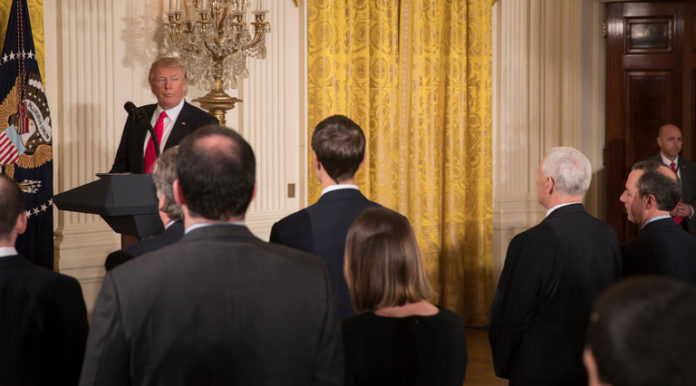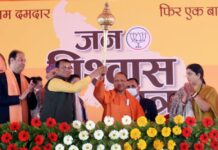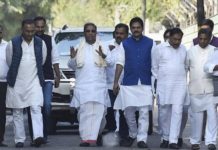But when you really start to look at most of the narratives surrounding what is happening in American politics, you’ll probably find that most of the dominant explanations are severely lacking in perspective.
To some degree, in order to explain a very tumultuous election year, we have to put aside Donald Trump himself and instead look at the years leading up to his election. It doesn’t take more than a quick google search or scroll through your Facebook newsfeed to hear all of the latest on the President’s current actions – let’s try to take a look behind the headlines.
Donald Trump Didn’t Win Because Of Donald Trump, He Won Because Of American Politics
Commentators, journalists, academics, politicians and people in general have been tearing their hair out trying to figure out just what Donald Trump did to appeal to America. How could a man who had run such a controversial, vitriol, divisive, shocking and unconventional presidential campaign actually won the Presidency? Was it bigotry, ignorance, hate, fear, Russian interference?
I’d like to propose that the real cause of Trump’s election is not any of these factors above, but rather a dominant political system which has systematically ignored the voices of average, ordinary Americans. Donald Trump didn’t sell people on the idea that he himself was an excellent candidate – he just convinced people that he was an anti-politician in a time when people hated politicians.
We can look to many different sources to provide evidence of this sentiment. Consider, for example, that since the 2008 election of President Barack Obama, the number of political Independents has nearly doubled, now totally more eligible voters than either the Republican or Democratic party.
In America, politics has been absolutely dominated by the elite. A comprehensive study on American politics put together by Northwestern and Princeton University looked at policies that are passed by Congress and compared them to the policies that public polls suggest the American people want. What they found? Here’s an actual quote:
“When the preferences of economic elites and the stands of organized interest groups are controlled for, the preferences of the average American appear to have only a minuscule, near-zero, statistically non-significant impact upon public policy.”
Are you still wondering why a white working class that perceived themselves as unthreatened by the demagoguery voted for a man who lamented politicians and called his opponents “puppets” of their donors?
The Two Inadequate And Obsolete Political Parties Are Unravelling Before Our Eyes
Consider the populist uprising that ensued several years after Obama took office. On both the liberal and conservative side, we saw huge public demonstrations of frustration with politics-as-usual and a refusal to bow to the will of the major political parties.
For the conservatives, this grassroots uprising took the form of the Tea Party. It started out as a grassroots coalitions of conservatives outraged by Obama and a Democratic majority and their own party’s failure to fight back. Eventually, the movement was infiltrated by the very source of political corruption in America, big-money donors, and it actually produced successful candidates that returned Congress to Republican control.
For the left, it was Occupy Wallstreet – a loud, clear and very public declaration by grassroots activists that the Democrats’ neoliberal policies were not enough. While the Obama administration bailed out the biggest banks and institutions after the 2008 financial crisis, ordinary Americans watched their livelihoods slip away without their own bail-out from the government.
Clearly, Americans who once may have felt at least somewhat represented by their party had already begun sending the message that their politicians and parties were no longer doing their job. To anyone who was in touch with this fact, the turmoil of the 2016 election probably wasn’t a huge surprise.
On the left, we witnessed a fierce battle between a neoliberal (Clinton) and a fiery Occupy-style progressive (Sanders), who arguably may have won had had the decks not been stacked against him by the “Democratic” party. Between super-delegates, poor media coverage, little name recognition and the Clinton political machine, he outperformed expectations to say the least.
And on the right, we see the dominance of the two “Tea Party” candidates Ted Cruz and Donald Trump, both of whom railed against politicians and the Washington “political establishment”. With Hillary Clinton as the symbol of the political establishment on the other side, is it any wonder why a public that has been effectively disenfranchised voted in the guy who said he was outside of the system?
Keep in mind that a large part of the reason Donald Trump won, especially in Rust Belt states like Wisconsin and Michigan, was because many Democratic voters were uninspired or repelled by Hillary Clinton simply declined to vote for President. In fact, reports from Michigan suggested nearly 90,000 filled out their ballots for local elections and simply left their choice for President blank. This was as much a result of Democrats fed up with their party as it was angry Tea Party Republicans.
This Is A Story Of The Cultural Division That Our Nation’s Leaders Have Pushed On Us
When we resist the popular narratives of the day and really take a look at the last few years, and indeed even decades, of political activities, we see a different story of the 2016 elections emerged. The Democratic and Republican parties have both been playing a dangerous game with the American people.
They’ve been tailoring their political rhetoric not to reflect the will of the people and advance their agenda, but rather to sell or obscure the interests of elites to the American people, the people our parties have actually been representing. To do this, they have been avoiding topics on which Americans can by-an-large agree on across parties and instead emphasizing the most divisive subjects.
Even worse, the major media companies in America who are tasked with explaining American politics to the people are owned and operated by the same elite interests that have influenced our government.
Abortion, gun rights, immigration, transgender bathroom regulations, science and religion – much of the political commentary we have heard from politicians and media alike are focused on the things that divide rural Americans from urban, religious Americans from secular, white Americans from Americans of color.
What we are left with is a public that is divided, confused, afraid and angry. We can’t trust the politicians, we can’t trust the media, we can’t trust each other – where can we turn to for hope, unity and progress?
Donald Trump was disruptive, but he told the American people that he was the anti-politician, the anti-media, and that he was the man with the answers to our society’s ills. Hillary Clinton sold herself as a continuation of the system we had before, a safe and stable choice. In a time of anti-government sentiment and calls for fundamental reform, people chose the disrupter over the status-quo. That shouldn’t be surprising.
Only “We The People” Can Turn Things Around
A cure for the ills of American politics will absolutely not come from the people who broke it in the first place. By nature, politics is an elitist activity – only those with time, money and extensive and influential social connections can afford to participate. That circumstance led to a government that is grossly corrupted by the interests of the wealthy over the interests of the average American.
The only way we can heal divide, build parties that represent people, and begin having faith and hope in our political system again is for us to get involved, build ways for others to get involved, and make sure we’re the ones organizing the future order of our democracy. American politics is down at the bottom of a murky swamp — it’s time for us to step in and clean it up.




